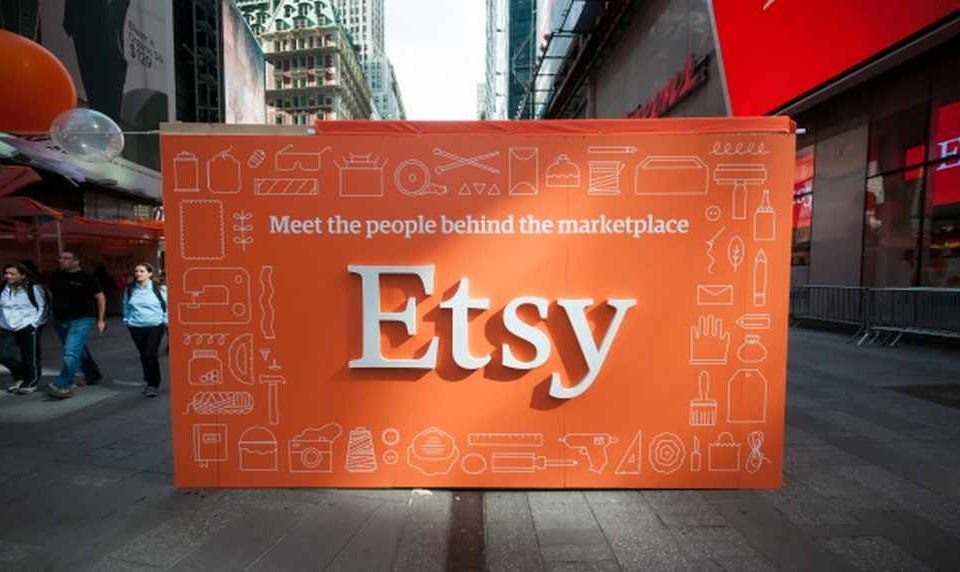Over 14,000 Etsy sellers go on strike to protest a 30% increase in transaction fees

Thousands of Etsy sellers begin a weeklong strike on Monday to protest a 30% increase in transaction fees. At least 14,000 Etsy sellers participated in the strike that they say cut into their profits. As of this morning, the online strike petition had 50,000 signatures.
In a February 24 email, Etsy CEO Josh Silverman notified sellers the higher fees would help cover the costs of better marketing programs, an expanded support team, and improved tech infrastructure.
The e-commerce giant rolled out a new set of policies that rolled out that include a 30% transaction fee increase—from 5% to 6.5%—set to take effect today April 11, 2022. In a statement, the company defended the fee increase as a necessary step to generate more sales for sellers.
“It got us talking and gave us the ability to find each other,” says Kristi Cassidy, an Etsy seller of 15 years who is organizing the strike. Sellers are asking buyers not to shop on Etsy from April 11 to 18, as thousands plan to put their shops into vacation mode.
On a Reddit thread for Etsy sellers, users began discussing the email, sharing outrage over the increased expenses and expressing cynicism over the company’s true motives. These conversations led to plans to take action.
Founded in 2005 by Chris Maguire, Haim Schoppik, Jared Tarbell, and Robert Kalin, Etsy is an e-commerce site and a smartphone application for buying and selling handmade and vintage items. Users can find products in the categories of clothing and accessories, jewelry, craft supplies and tools, weddings, entertainment, home and living, kids and babies, vintage, and more.
Etsy currently has about 5.3 million sellers. The marketplace allows small businesses and content creators to sell products directly to customers.
Below is the petition from the Etsy sellers.
Etsy made bank over the pandemic. In 2020, they more than doubled their gross marketplace sales. In 2021, they kept those pandemic sales gains and broke their 2020 record by $3.2 billion dollars.
In June of 2021, they acquired Elo7, the “Etsy of Brazil” to the tune of $217 million dollars cash.
In July of 2021, they completed acquisition of Depop, a British fashion marketplace, to the tune of $1.625 billion dollars, primarily cash.
They followed up these record pandemic gains by turning around and sticking it to their sellers.
On April 11, 2022, they plan to increase our transaction fees by 30%.
Etsy’s last fee increase was in July 2018. If this new one goes through, our basic fees to use the platform will have more than doubled in less than four years. These basic fees do not include additional fees for Offsite ads – which started during the first wave of the pandemic.
Offsite Ads pushes Etsy’s advertising costs onto their sellers, by charging us an additional 12-15% fee for each item sold through the Offsite Ads program. A 15% fee is charged to sellers who have never earned more than $10,000 in a year, and these sellers are allowed to opt out of the program. Other sellers pay 12%, and are never allowed to opt out.
Thanks to Offsite Ads, Etsy fees are an unpredictable expense that can take more than 20% of each transaction. We have no control over how these ads are administered, or how much of our money is spent.
Another mid-pandemic development is the Star Seller Program, a bizarre attempt to micromanage the terms of our engagement with our buyers and audiences. Meanwhile, Etsy sellers routinely report waiting weeks or months for responses to urgent Etsy support tickets.
AI-powered bots shut down legitimate seller accounts seemingly at random, while Etsy looks the other way on resellers who undercut authentic makers by peddling sweatshop-produced junk in clear violation of the spirit of the Etsy community. Rather than rewarding the sellers whose hard work has enabled Etsy to become one of the most profitable tech companies in the world, Etsy gouges us, ignores us and patronizes us.
As individual crafters, makers and small businesspeople, we may be easy for a giant corporation like Etsy to take advantage of. But as an organized front of people, determined to use our diverse skills and boundless creativity to win ourselves a fairer deal, Etsy won’t have such an easy time shoving us around.
We’re going on strike on April 11 to call on Etsy to hold itself accountable to sellers and buyers. Sellers will put their shops on vacation mode in protest. Buyers can show support by agreeing to boycott Etsy from April 11-18.
These are our demands:
1: Cancel the fee increase.
Increasing seller fees by 30% after two years of record sales is nothing short of pandemic profiteering. After the planned increase, our fees as sellers will have more than doubled in less than 4 years.
2: Crack down on Resellers
Etsy needs to provide a comprehensive plan for tackling resellers (people selling mass produced goods that they have not even designed themselves) on the platform. This plan must be transparent so that sellers can hold Etsy accountable.
3: “Golden” Support Tickets
People are waiting months to appeal computer-made decisions that stop them from accessing their own earnings, or running their business entirely. These people should have an automatic fast track through Etsy’s infamously slow support system. Etsy can’t bill itself as a folksy, handmade utopia while AI bots terrorize sellers whose livelihood depends on reaching buyers on the platform.
4: End the Star Seller program
Passive aggressive efforts to influence seller behavior are counter-productive and result in a worse customer experience. Rather than making us mad at buyers who leave glowing 4-Star reviews, or making us feel that we can no longer offer letter class shipping on items like cards and stickers, Etsy should leave us to individually do the best we can for each and every customer in each and every situation.
5: Let All sellers opt out of Offsite Ads
We should be in control of which listings to advertise, how much we spend on ads, and whether to advertise at all. There should be no level of “success” that forces sellers to foot Etsy’s advertising costs, unless we choose to. That “success” level being well below the federal poverty line only adds insult to injury.
Why is this important?
Etsy was founded with a vision of “keeping commerce human” by “democratizing access to entrepreneurship.” As a result, people who have been marginalized in traditional retail economies — women, people of color, LGBTQ people, neurodivergent people, etc. — make up a significant proportion of Etsy’s sellers. For many of us, Etsy makes up our main source of income.
But as Etsy has strayed further and further from its founding vision over the years, what began as an experiment in marketplace democracy has come to resemble a dictatorial relationship between a faceless tech empire and millions of exploited, majority-women craftspeople.
Unlike employees or tenants in traditional retail marketplace settings, Etsy can fire or evict us at any time, for any reason, with no recourse. Our fees (the rent we pay as tenants of Etsy’s marketplace) can be unilaterally raised any time Etsy feels like it. Etsy can and does withhold payments to sellers for months at a time, without any process for appealing or speaking with a representative of the company.
Even though it’s the hard work of Etsy’s sellers who’ve made it the massively successful company it is today, we have fewer rights and less of a voice in our workplaces than ever.
It doesn’t need to be this way! Etsy can be a successful and profitable company while still treating its sellers fairly and ethically. Etsy can be the force for good it initially set out to be. And together, Etsy sellers and the buyers who support us can show hyper-exploited platform workers everywhere that there’s a better way, if we unite in solidarity and work together to achieve it!




